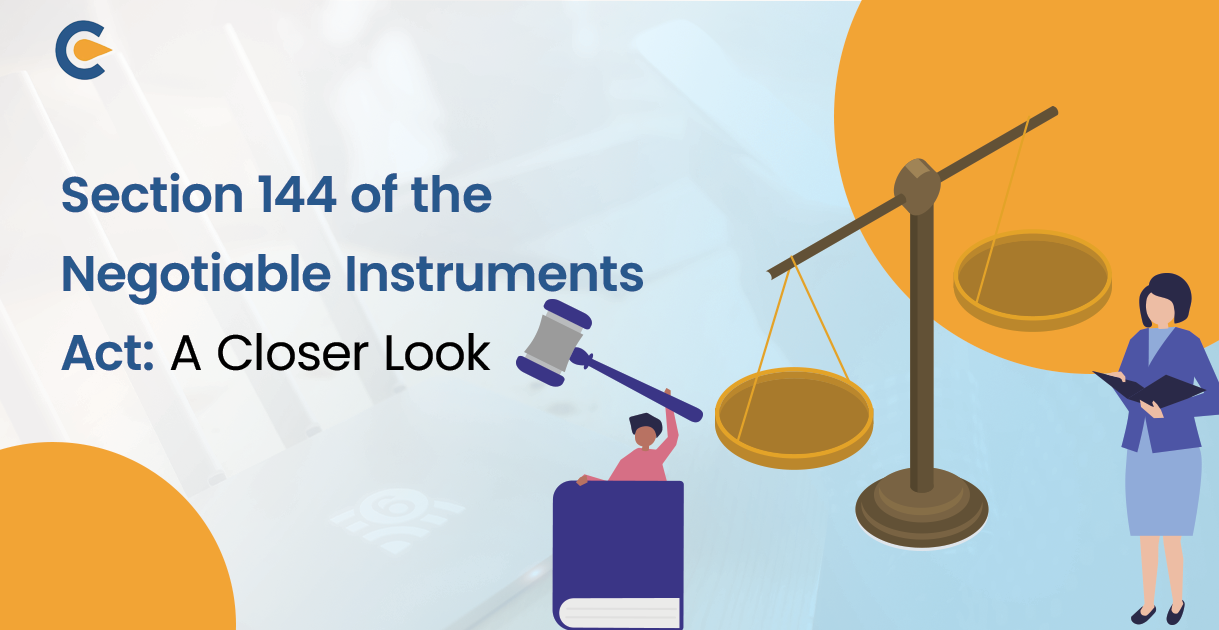The summons plays a significant role in the administration of justice. It is a widely acknowledged term that is followed in the law. Any individual, entity, defendant, or witness can often be summoned to appear in person before the Court using this useful way. Any party, individual, witness, or defendant is ordered to appear in person before the Court by summons. Thus, a summons is an order of the Court for someone to appear in person in front of the Court. It is given to the opposing party following the plaintiff’s filing of the lawsuit.
Negotiable Instruments Act, 1881
One of the most critical pieces of legislation that controls the usage of negotiable instruments in India is the Negotiable Instruments Act of 1881. It lays out guidelines for managing checks, bills of exchange, and promissory notes. In order to establish a unified regulatory structure for the utilization of negotiable instruments in India, the Act was passed. To keep up with evolving business procedures and mandates from regulators, the Act has undergone many amendments.
A document or piece of paper that promises the delivery of a certain amount of money, either right away on demand or later on a specific date, and whose recipient is usually acknowledged, is called a negotiable instrument. This is a written agreement, either in its entirety or in part, that ensures the unconditional transfer of funds, which can either be given now or at a later date.
Analysis of Section 144 of the Negotiable Instruments Act
The analysis of section 144 of the Negotiable Instruments Act discusses the mode of service of summons under the Negotiable Instruments Act. There are two sub-sections in section 144 of the Negotiable Instruments.
The sub-section (1) of section 144 of the Negotiable Instruments states that when a summon is issued by the Magistrate to any witness or accused, the copy of the summons may be directed to be served at the witness or the accused place of residence, which is where he lives in daily life or the place of his/her work, or a place where he/she works for gains. A copy of the summons can be sent through speed post or any courier services that are approved by the Court and are in session.
The sub-section (2) of section 144 of the Negotiable Instruments states that when there is an acknowledgment by means of a signature by the witness or the accused or any endorsement is made to the authorized person who is working with the postal department that the witness or the accused has denied taking the summons is received by the Court; then in that circumstances, the Court will declare that the summon has been served duly to the witness or the accused.
A summons can be served by registered post services to the witness and the accused by section 144 of the Negotiable Instruments. It is crucial to remember that summonses to an accused individual cannot be sent out by registered post; instead, they must be presented in person, according to court rulings. It is thus required to present either the personally signed response required or an endorsement from the postal department or courier service declaring the accused’s unwillingness to accept the summons received by the registered post. The Court shall not assume that any summons is considered properly served in the absence of such endorsement or recognition.
Solely if a company is a party committing an offense under section 138 would section 144 of the Negotiable Instruments Act apply? All individuals in control of the firm at the time of the offense will also be considered guilty of the offense. In addition, they are going to be subject to prosecution and appropriate punishment, with the exception of what this subsection specifies:
- If someone can show convincing proof that they were not aware of the offense being committed, they won’t be punished.
- If it can be proved that the accused took all reasonable steps to stop the offense from being committed, there won’t be any punishment.
Let’s say a business violates this Act and it can be demonstrated that employees of the business either approved of the violation or failed to report it. If such is the case, it will also be found guilty of that crime and will face the appropriate charges and penalties.
To Wrap Up
In conclusion, the mode of service for summons under the Negotiable Instruments Act is given under Section 144 of the Negotiable Instruments Act. This mode of summon service is only for the chapter included in the Negotiable Instruments Act. Corpbiz provides expert guidance and assistance for matters related to cheque bounce and other services related to negotiable instruments.
Frequently Asked Questions
What is the mode of service of summons under Section 144 of the Negotiable Instruments Act?
The summons can be sent through speed post or approved courier services by the Court as per section 144 of the Negotiable Instruments Act.
Is the Negotiable Instrument Act a civil or criminal case?
The Act under the Negotiable Instrument Act is a civil wrong, but there are also criminal punishments.
How many types of summons are there?
There are three main types of summons. The three types are administrative, civil, and citation summons.
How summons can be served?
The police officer or the person authorized by the Court serve the summons. The rules and regulations related to summons are laid down by the state government. The public authority and the Court are the parties that follow them.
What is the limitation of the Negotiable Instrument Act?
The limitation of the Negotiable Instrument Act is of thirty days. It is vital to ensure that urgency is maintained and that justice is not put off for too long. The limitation period is to be followed as mandatory, and if the period is missed, the Court can dismiss the case.
Is Section 144 of the Negotiable Instruments Act an important part of the Negotiable Instruments Act, of 1881?
Yes, Section 144 of the Negotiable Instruments Act is one of the vital sections of the Act as it gives clear guidance on how to serve the summon and its mode of service.
What does section 144 of the NI Act deal with?
Section 144 of the NI Act deals with summons and how to serve specifically in regard to the NI Act.
Read also about Understanding The Cheque Bounce Law In India











